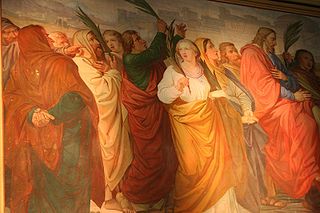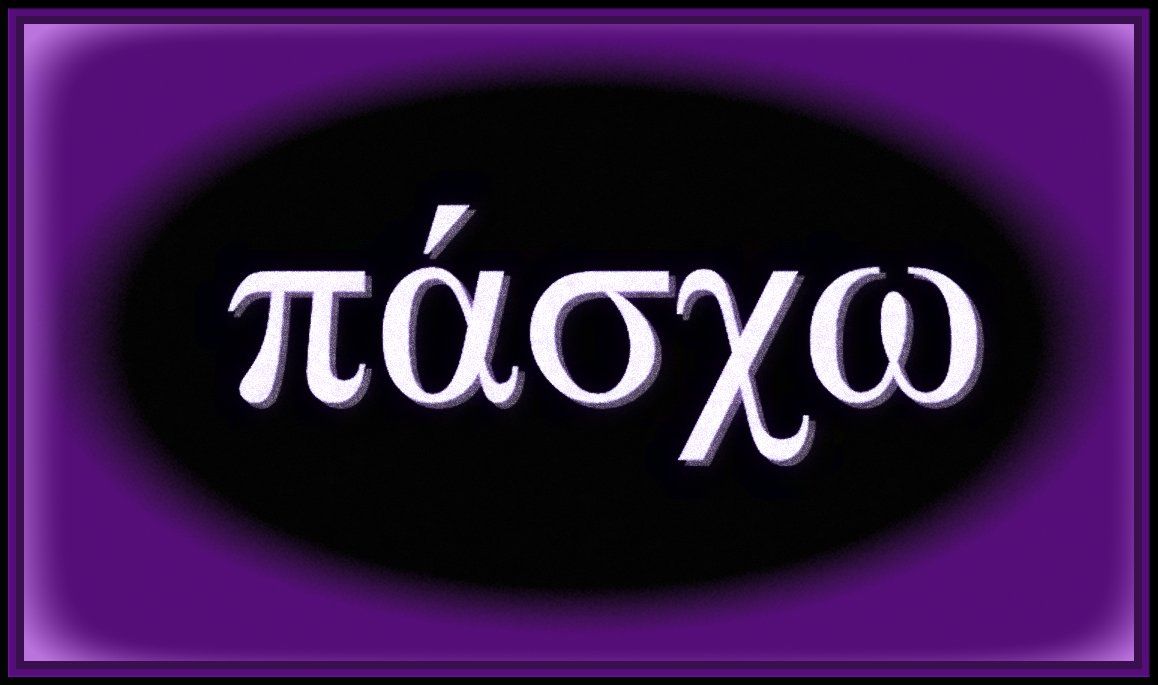 |
| Entry of Jesus into Jerusalem Art: Fresco in the parish church of Zirl, Austria Soure: Wikipedia |
Easter 2015: April 5, 2015 (Gregorian)
Easter 2015: April 12, 2015 (Julian)
As most Christians who follow the Gregorian calendar being the Holy Week with the Sunday of the Passion please remember that this day is much more than waving palms but instead is the beginning of events leading to the walk along the Via Dolorosa, the Way of the Cross to Golgotha. There is no freedom from sin through Christ's resurrection but by His suffering and death on the cross. For Orthodox Christians who follow the Julian calendar this week begins on April 5 with Easter on April 12.
 |
| Greek: Pascho = Passion
Strong's Concordance for the King James Version (KJV) of the Holy Bible tells us that the word pascho means to be affected or have been affected, too feel, have a sensible experience, to undergo, in either a good sense or in a bad sense.
Acts 1:3 KJV. To whom also he shewed himself alive after his passion by many infallible proofs, being seen of them forty days, and speaking of the things pertaining to the kingdom of God.
We can readily conclude without hesitatioin that what involves passion in this sense in much more that a fuzzy warm feeling or a time of being a little down in the dumps. Neither is this passion related to a specific intimate experience in the manner of feeling passionate towards someone.
Strong's G3958 as used in the KJV New Testament is a physical experience and not a reactionary emotion. This passion has to do with suffering, even to death. It is in this case the experience of the cross. Below is the list of Scripture verses that use G3958. Other Bible versions when using other words for pascha other than passion and suffer, if a good translation, will have related synonyms that make sense. Click Here to go to BlueLetterBible.org, my source for this information. Matthew 16:21, 17:12, 17:15, 27:19 Mark 5:26, 8:31, 9:12 Luke 9:22, 13:2, 17:25, 22:15, 24:26 Acts 3:18, 9:16, 17:3, 28:5 1 Corinthians 12;26 2 Corinthians 1:6 Galatians 3:4 Philippians 1:29 1 Thessalonians 2:14 2 Thessalonians 1:15 2 Timothy 1:12 Hebrews 2:18, 5:8, 9:26, 13:12 1 Peter 2:19, 2:20, 2:21, 2:23, 3:14, 3:18, 4:1, 4;15, 4:19, 5:10 Revelation 2:10 Eastern Orthodox Christians have a preference for calling the day of resurrection of our Lord and Savior Jesus Christ, Pascha. OrthodoxWiki.org offers the following explanation. Pascha, also called Easter, is the feast of the Resurrection of the Lord. Pascha is a transliteration of the Greek word, which is itself a transliteration of the Hebrew pesach, both words meaning Passover.
Pascha normally falls either one or five weeks later than the feast as observed by Christians who follow the Gregorian calendar. However, occasionally the two observances coincide, and on occasion they can be four weeks apart. The reason for the difference is that, though the two calendars use the same underlying formula to determine the festival, they compute from different starting points. The older Julian calendar's solar calendar is 13 days behind the Gregorian's and its lunar calendar is four to five days behind the Gregorian's. LINK
|
No comments:
Post a Comment